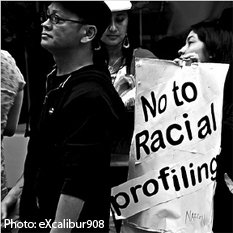
The announcement that the U.S. Justice Department has charged members of the East Haven, Connecticut Police Department with violating the civil rights of Latinos is both good news and deeply disturbing. The investigation of improper targeting by local law enforcement of Latinos in Connecticut, along with DOJ’s recent scathing report of the constitutional violations perpetrated against Latinos by Maricopa County, Arizona’s Sheriff Joe Arpaio, are welcome signs that the federal government is taking action to protect people of color from having their most basic rights compromised by racial profiling. Less welcome is the repeated appearance of this particular kind of discrimination in so many parts of the country. Incidents like these raise questions of whether we are dealing with isolated, events or facing examples of rapidly spreading problems that threaten to engulf our entire nation.
The allegations against law enforcement in Arizona and Connecticut are sickeningly similar. The Justice Department report confirmed complaints made in a four-year old civil rights law suit filed by the ACLU. Latinos in Maricopa County were routinely subjected to what a Justice Department expert labeled as “the most egregious cases of racial profiling” he had ever observed Latinos were pulled over and ticketed for offenses to for which whites were not. People with limited command of English were subjected to abuse upon arrest because of their inability to understand orders issued by law enforcement. Meanwhile, on the other side of the country, East Haven, Police subjected Latino residents and businesses to unwarranted and discriminatory harassment and arrest.
In both states, people who had committed no offense other than being or appearing to be Latino were harassed and told, effectively, that the rights supposedly granted to everyone by the Constitution did not apply to them and that they were not entitled to the protection of the law by those charged with enforcing it.
The appearance of this problem in Connecticut raises unsettling questions. Whether talking about abuses in Arizona or the spate of anti-immigrant laws that started in Arizona and have spread to Alabama, Georgia, South Carolina and Utah, there is a temptation to minimize how widespread trends of unlawful discrimination against immigrants are. It is easy to dismiss this racial profiling as the result of the antics of an attention-hungry sheriff or the attempt by a few, unenlightened southern politicians to make hay out of the fears and resentments against black and brown immigrants. But the existence of the practice in the “liberal” state of Connecticut begs the question of whether we can afford to be complacent about intolerance and discrimination anywhere in the country.
It is encouraging that the Justice Department has taken decisive steps in these two cases. We can only hope that the federal government will continue to take aggressive action in each and every instance in which it is warranted. But the problem is not one that can be addressed by the Justice Department alone. It is a problem that all Americans must face. Ultimately what is at stake is not just the ability of people of color to be free to drive on public streets, patronize businesses or to rely on law enforcement for protection. What is at stake is the kind of country we choose to be. Any willingness to accept the abridgement of the rights of some in the name of enforcement of immigration laws, or national security or fighting crime erodes the very foundation of our nation. We must recognize that injustice anywhere and against anyone is injustice against us all.
Learn more about racial justice: Sign up for breaking news alerts, follow us on Twitter, and like us on Facebook.





